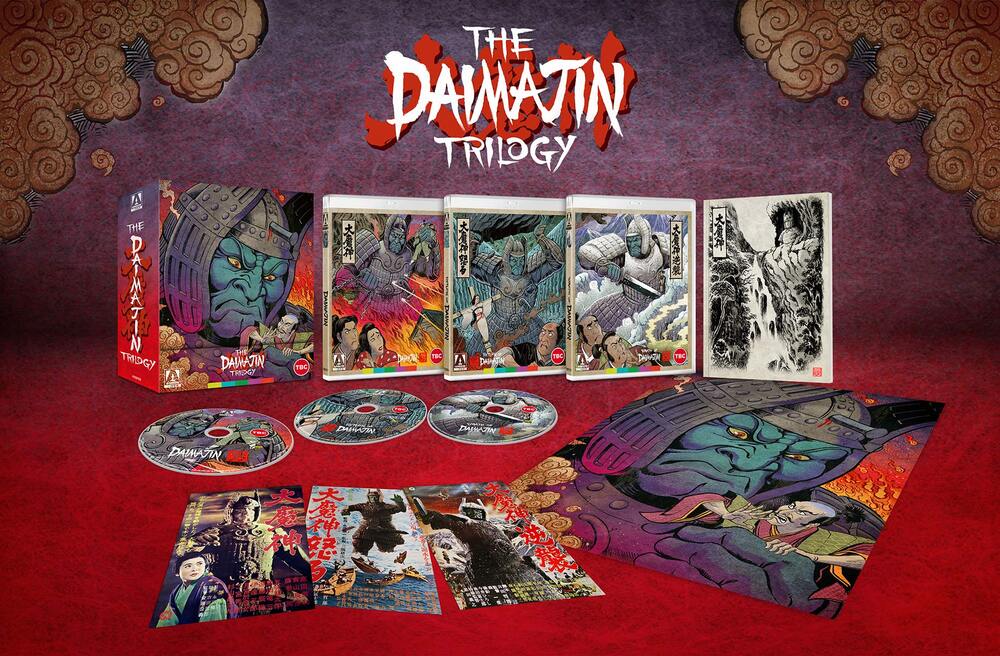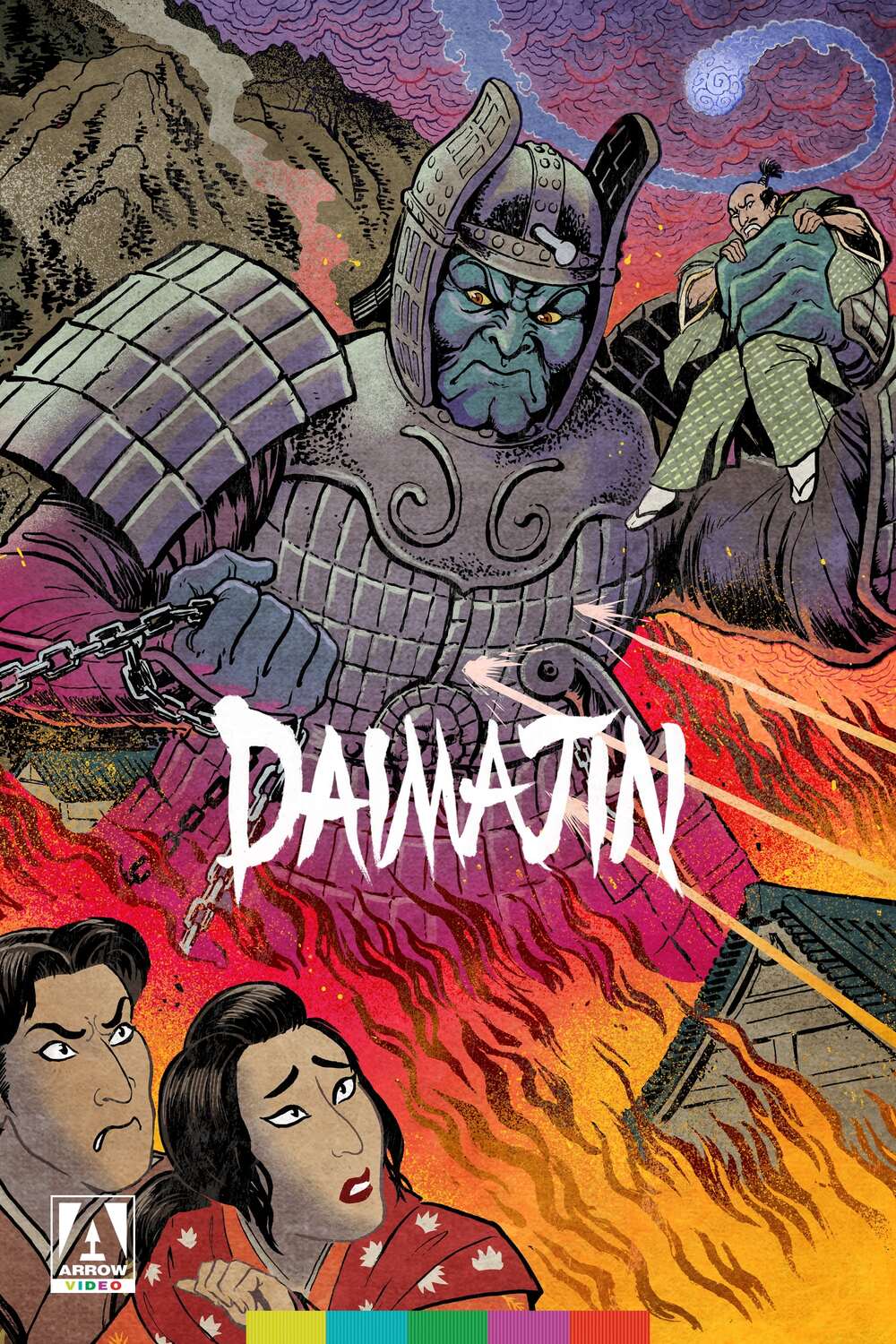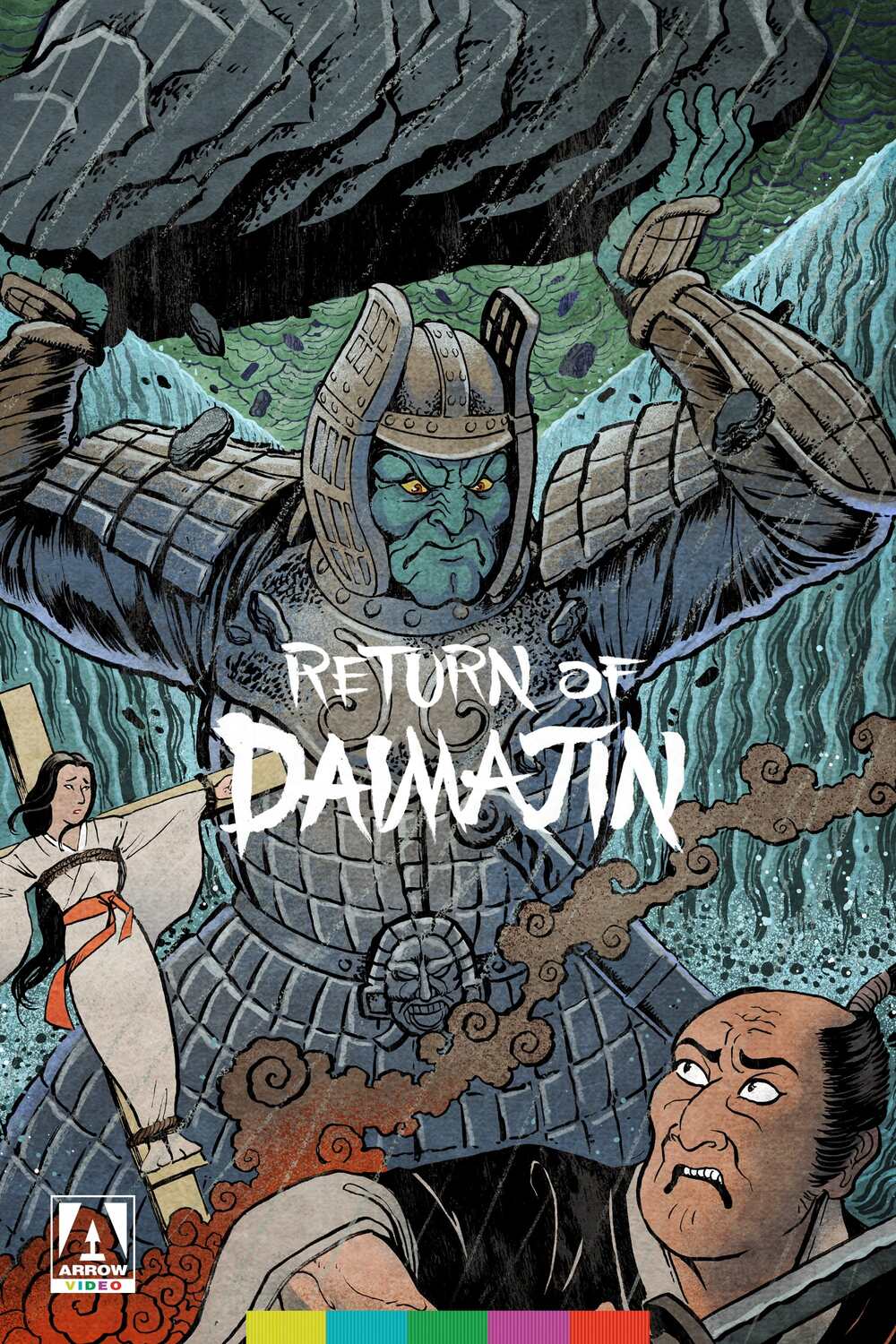-
Par kluseba le 13 Octobre 2022 à 19:51

Daimajin (1966) - Excellent Mixture of Period Drama and Giant Monster Movie - 8/10

Daimajin is a creative mixture of a jidaigeki and a kaiju. The former describes a period drama in the style of samurai movies such as the excellent Zatoichi film series. The latter describes films with giant monsters such as the Gamera film series. Daiei Film attempted to combine both genres and managed to create, promote and release three extraordinary films in the same year that deserve more attention, recognition and respect.
Daimajin is the first entry. It tells the story of a chamberlain who is planning a violent coup d'état. He attempts to murder his lord's entire family but the son and daughter are saved by a courageous samurai. The samurai gets additional help from his aunt who is a priestess of Daimajin. The children grow up in hiding in several caves under the statue of Daimajin. As the chamberlain has established a pitiless tyranny, the oldest son plans to take back what should belong to him. When his plan fails tragically and the chamberlain's men are about to destroy the statue of Daimajin, the demon god comes to life and punishes the wrongdoers.
This movie convinces on many levels. First of all, it has excellent flow, pace and structure in its concise running time of eighty-four minutes and doesn't ever get boring for one single second.
Up next, the film's characters are particularly intriguing. The protagonists are courageous, loyal and perseverant which makes viewers empathize strongly with them. The antagonists on the other side are brutal, immoral and selfish which makes viewers despise them. The movie also includes several memorable side characters with strong emotional motives whose actions are interesting to follow.
The movie's special effects are surprisingly great, especially if compared to the Gamera film series that hasn't aged particularly well. The titular monster looks scary, the historic settings have been constructed with great care and the final fifteen minutes are filled with spectacular actions and events.
As you can read, Daimajin is a movie that should equally please jidaigeki and kaiju fans. This movie has the depth and details of the former and the energy and imagination of the latter. This film has aged surprisingly well and its morals still apply today. Daimajin makes for a wonderful movie for the entire family as children, teenagers and adults should be similarly delighted. Make sure to purchase the wonderful boxed set by Arrow Films that includes all three movie, plenty of bonus material, a detailed book about the film series and a wonderfully colourful cover that should make anyone who doesn't own this gem particularly jealous.
Daimajin Ikaru / Return of Daimajin (1966) - A Great Example of How to Make a Timeless Movie with a Limited Budget but Much Professionalism - 9/10

Return of Daimajin is the second film in the trilogy about the great demon god that combines elements of period dramas and giant monster movies. In this shortest movie of the series, an evil lord menaces, destroys and conquers two neighbouring villages when farmers seek refuge from him in these peaceful places. The survivors of the invasion retreat to an island on a lake where Daimajin's statue is hidden in a cave. As the lord destroys the statue, the demon god comes to life to save the villagers from the murderous dictator.
This movie convinces on numerous levels and has aged very well. First and foremost, this film clocks in at only seventy-nine minutes and entertains from start to finish with swift pace.
Up next, the locations have been chosen particularly well and bring ancestral Japan back to life. The scenic mountains and fields, the colourful villages and fortifications as well as the mysterious island on the lake are quite memorable.
The characters are also very intriguing. The antagonist is particularly brutal, pitiless and selfish and will make viewers root against him. The protagonists shine with courage, perseverance and resilience and will make viewers empathize with them. Even the side characters have interesting emotional characteristics to offer. Needless to say that the skilled acting performances match the wonderful script.
The final twenty minutes of the movie are particularly spectacular. The titular monster goes on an impressive rampage as the simple yet efficient special effects shine brightly in this movie. The architecture of the villages, the armour of the monster and the costumes of the villagers have all been crafted with great detail. The destruction of infrastructures looks impressive and has been prepared very skillfully and filmed very precisely.
The technical aspects of this movie are very strong in general. Even decades later, the calm, organized and precise camera work stands out very positively if compared to numerous action movies with dizzying shaky camera sections. The authentic, detailed and intense sound effects in the destructive finale will send shivers down the spine of any cineast. The excellent classical music soundtrack by skilled veteran Ifukube Akira is another noteworthy highlight and makes an intense movie even more emotional.
As you can read, Return of Daimajin is even a slight improvement over its critically acclaimed genre-breaking predecessor Daimajin. This sophomore entry is even more detailed, organized and precise as it turns out being a great example of how to make a timeless movie with a limited budget but much professionalism. The two movies aren't directly related to each other, so you could watch Return of Daimajin as a standalone feature. Anyone who likes period dramas and monster movies should call a copy of this movie her, his or their own. I would suggest picking up the wonderful boxed set by Arrow Media with all three films and plenty of interesting bonus material.
Daimajin Gyakushû / Wrath of Daimajin (1966) - Adventurous Conclusion to an Underrated Franchise - 9/10

Wrath of Daimajin is the third, final and best entry in the Japanese franchise about the ancient demon god who protects his disciples from cruel injustices. In this movie, a group of lumbermen have been kidnapped by the henchmen of an evil lord who is trying to build powerful weapons to invade neighbouring communities. One lumberman survived severely injured and made it back to his village. While the adults in the village are too scared to try to save their fellow citizens, four young boys decide to leave secretly to save their kidnapped fathers. However, they don't only have to confront the evil lord's pitiless army but numerous natural obstacles such as dangerous earthquakes, wild rivers and heavy snowfall. The four boys have to go onto Daimajin's sacred mountain to make it to the evil lord's labour camp and the mysterious deity decides once more to intervene.
This third movie has a completely different vibe than the previous entries. First of all, the protagonists of this movie are four courageous children. Daiei Film attempted to aim for a younger target audience with this movie and the company did a surprisingly convincing job. In addition to this, Wrath of Daimajin can certainly be described as an adventure movie as it follows the children's epic journey across the mountains. Another element that might come as a surprise is that this movie might also be the most brutal one in the franchise. If you thought that this movie might be less intense because children are involved, you are gravely mistaken. These little doses of stunning intensity make this film also the most captivating, emotional and profound one in the franchise.
The movie also convinces in the departments that made the previous entries so enjoyable. The locations are absolutely stunning and vary from traditional mountain villages over dense forests, beautiful meadows and sinister screes to desolate labour camps. The balance between beauty and terror in these locations leads to an emotional rollercoaster ride.
The special effects are once again stunning for their time. The way the filmmakers created artificial snow looks particularly realistic. The scenes on an improvised raft on a dangerous river are particularly memorable. The closing twenty minutes show the titular monster in a most diversified way as a mystical saviour and a fair avenger.
The acting performances also deserve critical acclaim. The four child actors are everything but shallow and play their roles with focused dedication and emotional depth. The adults also do wonderful jobs as the fearful peasants evoke strong controversial feelings among viewers while the antagonist is particularly brutal and is even shown torturing one of his prisoners to death.
In conclusion, Wrath of Daimajin is the best entry in the trilogy about the ancient demon god. This movie mixes genre elements of adventure, drama and fantasy in an equally entertaining and profound way. This film should be enjoyed by cineasts of any age and its quality has stood the test of time. It's regrettable that this is the last entry in the franchise since the quality of this trilogy is better than more renowned film series such as Gamera and even Zatoichi. Make sure to purchase the wonderful boxed set by Arrow Films since its elevated price is justified by enjoyable multiple viewings of these three masterpieces.
-
-
Par kluseba le 30 Septembre 2022 à 15:53

Sonata Arctica's Acoustic Adventures (Volume Two) are from the same sessions as the first volume that was released earlier this year. The Finnish quintet has actually been playing acoustic shows for quite a while now and it was only a matter of time until the band would release some acoustic albums as well. It would have been better to insert a regular studio album between these two acoustic efforts for the sake of diversity but the final results are nonetheless satisfying for fans of the band's more recent material that sounds rather soothing, relaxing and introspective.
The good news is that this second release is even slightly better than its predecessor. The main reason for this increase in quality is a more balanced production without overtly loud keyboard sounds or vocals. This record here flows very well and sounds coherent from start to finish.
Another interesting element is that some of the chosen songs sound very different from their original versions. This is for instance the case for closing ballad ''Victoria's Secret'' that sounds quite playful and quirky here but comes around with a shorter and more concise running time. ''Half a Marathon Way'' almost enters progressive rock territories with its intriguing changes and also clocks in roughly one minute under its original running time.
Some songs really shine in their enchanting acoustic settings. Empowering band anthem ''I Have a Right'' sounds even more empathic in its stripped-down version and opens the record on a high note. The playful ''Black Sheep'' shines in a rhythmic country rock style that is much more distinctive than its original version in my opinion.
Other songs however don't benefit from their acoustic renditions. The most obvious case here is the classic band anthem ''FullMoon'' that sounds so energetic in its original version and simply needs to be played at full volume and be sang along to in concert. The acoustic version however doesn't have the original's liberating power and invites a lot less to sing along. This rendition sounds tame and only qualifies as slightly above average tune that doesn't leave a significant mark. Similar things could be said about ''My Land'' that is even slightly longer than its original version and lacking the energy of the original version. It doesn't clash as much with its original version as the aforementioned song does but certainly can't compete with it either and fails to leave a lasting impression.
At the end of the day, those who have purchased the first volume of these acoustic renditions should also buy this second effort that is even slightly better due to a more balanced production. However, the acoustic versions overall can't compete with the original songs despite a few creative reinterpretations here and there. Those who have been criticizing Sonata Arctica's mellower style in recent years should actually avoid both releases altogether. On the other side, fans of the band's softer side will find much depth on both records and could enjoy listening to these to relax on upcoming could autumn and winter nights.
Final Rating: 72%
-
-
Par kluseba le 26 Septembre 2022 à 21:42

Legendary German heavy metal quartet Grave Digger has certainly been very prolific throughout the past decade, releasing seven studio albums in the past ten years. However, the releases had significant ups and downs with atmospheric, creative and epic highlights such as Clash of the Gods and with old-fashioned, predictable, repetitive albums such as Return of the Reaper. Symbol of Eternity isn't as disastrous as the band's worst offerings but it sadly has more things in common with the band's lowlights than with its highlights.
Opening track ''Battle Cry'' is a very good example for the aforementioned thesis. Upon first contact, the song seems quite decent. The guitar play is fast, fierce and heavy. The rhythm section is precise and thunderous. The verses sound aggressive while the chorus aims to be anthemic. The intense, raw and throaty vocals add oomph to the verses while being complemented by choirs in the epic refrain. The song doesn't overstay its welcome as it clocks in under four minutes. The main issue however is that the band has been recording this type of song time and again. One can't shake the feeling to have heard the song before and yet, it doesn't have any distinctive qualities to make it stand out. Once the song has rushed by, it simply won't stay on your mind and doesn't leave any significant impression.
The same thing could be said about fast-paced heavy metal stomper ''Hell Is My Purgatory''. The song is aggressive, quick and traditional as it recalls material from recent side project Hellryder. While the song might make fans want to bang their heads in concert, it simply can't compete with the group's classic heavy metal anthems from the nineties and early years of the new millennium. Once again, the songwriting sounds rehashed and is by the numbers as it will only please the most traditional fans who don't want this band to experiment and expand its horizons.
Luckily, the album's few more experimental tunes manage to save the day and make an average album at least decent. ''Grace of God'' for instance opens with campfire guitar sounds that lead to symphonic heavy metal sections with epic keyboard sounds. A few creative percussive elements keep the creativity going. The vocals vary intriguingly between slow and melodic sections on one side and aggressive and fierce passages on the other side. This is certainly the record's most versatile, inspired and memorable song.
Closing bonus track ''Hellas Hellas'' is a cover song performed in Greek with original singer Vasilis Papakonstantinou who is already seventy-two years old. This song comes completely out of left field and turns out being a simple heavy metal song with a playful, memorable and almost danceable vibe, therefore combining Grave Digger's trademark style and the song's original tone. This tune is certainly a refreshing tribute to Greek culture and should strike a chord with fans upon the band's next concert in Greece.
At the end of the day, Grave Digger's Symbol of Eternity is a decent heavy metal record with all of the band's classic trademarks such as energetic melodic guitar play, thunderous rhythm section and raw vocals. Sadly, the songwriting is repetitive, predictable and old-fashioned but the band manages to break new ground on a few select successful occasions. Symbol of Eternity can therefore be recommended to adamant traditional heavy metal aficionados and faithful fans of the band but occasional listeners or fans of the band's more creative conceptual efforts should skip this output. On a positive side note, the limited edition includes a decent live record with ten songs and an introduction that is certainly worth the slightly more elevated price and rates this release up by a few points.
Final Rating: 67%
 Suivre le flux RSS des articles de cette rubrique
Suivre le flux RSS des articles de cette rubrique













